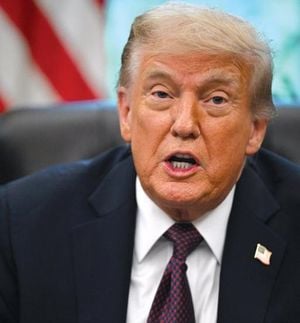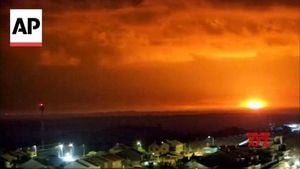The recent declassification of files surrounding the assassination of President John F. Kennedy has sent waves of intrigue rippling through American society. Following President Donald Trump's order for the release, there are new revelations about JFK's life, his presidency, and the circumstances surrounding his tragic assassination.
According to reports by RadarOnline.com, among the newly revealed information is the existence of hidden footage showing JFK acting out his own death. The chilling home movie, which remained undiscovered for decades, depictures the president portraying his assassination, signaling he might have sensed the tragic fate awaiting him months before he was fatally shot on November 22, 1963.
This footage, filmed during a family retreat at Hammersmith Farm, the childhood home of Jackie Kennedy, showcases JFK playacting various aspects of his death. The scenes were silent and reportedly filmed during late September 1963, just weeks before he was assassinated. One particularly dramatic moment features JFK 'falling' from his yacht after being struck by imaginary bullets, with ketchup used for special effects to resemble blood as friends tromped over his prone body.
Such imagery raises unsettling questions about the emotional and psychological state of the president leading up to his assassination. Some close friends of JFK were present during the faux death scenes, including Paul 'Red' Fay, who later stumbled over JFK’s 'body.' The implausibility of such antics leaves many wondering about the nature of JFK's mental state and whether he had premonitions about his life being cut short.
While the film was crafted with elements of satire, it foreshadowed the real-life tragedy Kennedy would face. Insiders suggest this may have stemmed from grief over the earlier loss of his second son, Patrick, who died shortly after birth. Reports indicate JFK found solace and catharsis through this creative expression, attempting to ease the fears he harbored about his mortality.
A source noted, "It could easily have been just a fantasy to release many of his own internal fears and counter his own phobic behavior..." These statements invoke the image of JFK, not only as the inspired leader of the country but also as a man burdened with deep fears and vulnerabilities.
Since President Trump's declassification order, discussions have surged surrounding JFK's legacy. Many historians have begun reassessing the impact of his administration and his untimely death on subsequent generations of Americans. JFK was often lauded for his charisma and vision for America, famously challenging citizens to ascend to the 'New Frontier' of progress, science, and peace. His style and personality attracted millions, making his assassination not just the loss of a leader, but the shattering of hope.
Historian and biographer Brad Meltzer recently highlighted the significance of JFK’s narrow victory over Richard Nixon, emphasizing, “Kennedy’s victory was the smallest popular vote margin of any presidential candidate of the 20th century.” Although he won the presidency, the fear and uncertainty surrounding his tenure were palpable, with many believing his ambitious goals were left unfulfilled due to his untimely assassination.
Recollections from individuals who experienced JFK's visit to Pocatello, Idaho, also resurfaced following the news. Mark Nye, who witnessed Kennedy speak during his campaign, described the excitement generated by the young senator’s presence, saying Kennedy was viewed almost like a rock star. His appeal crossed the political spectrum, drawing Democrats and Republicans alike to rally around a vision for America.
Reflecting on his death, Richard Stallings, former Congressman from Idaho, recalled how he learned of JFK’s assassination over 50 years ago. Stallings described the shock and pain he felt, saying, "It was almost like you lost a personal friend or family member." Such sentiments still resonate today—Kennedy's legacy as both a leader and as the quintessential American icon persists, with his tragic death serving as stark evidence of the fragile nature of life and leadership.
JFK's persona and style, serving as the embodiment of hope and potential, were transformative for the nation. Just as discussions around his presidency evolve with new information, so too does the collective memory of the American people. The release of these new assassination files offers not only historical insights but also invites continued dialogue about JFK's contributions, the reactions to his tragic assassination, and the complex interplay of joy and grief throughout his time as president.



